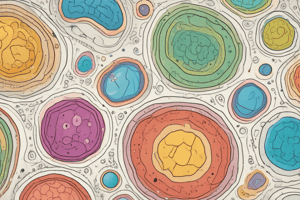Podcast
Questions and Answers
What is the primary function of the nucleus in a cell?
What is the primary function of the nucleus in a cell?
- To produce ATP for energy.
- To digest dead cells.
- To synthesize lipids and detoxify drugs.
- To control cell processes and produce RNA. (correct)
What is the role of ribosomes in the cell?
What is the role of ribosomes in the cell?
- To translate mRNA into amino acids. (correct)
- To package proteins and lipids.
- To generate hydrogen peroxide.
- To provide structure and support for the cell.
Which organelle is responsible for detoxification and lipid synthesis?
Which organelle is responsible for detoxification and lipid synthesis?
- Smooth endoplasmic reticulum. (correct)
- Golgi apparatus.
- Rough endoplasmic reticulum.
- Lysosomes.
How does the nuclear envelope function in a eukaryotic cell?
How does the nuclear envelope function in a eukaryotic cell?
What is the primary function of lysosomes within a cell?
What is the primary function of lysosomes within a cell?
What is one of the main roles of the Golgi apparatus?
What is one of the main roles of the Golgi apparatus?
Which organelle is known as the powerhouse of the cell?
Which organelle is known as the powerhouse of the cell?
What is a primary function of the cytoskeleton in cellular structure?
What is a primary function of the cytoskeleton in cellular structure?
Flashcards
What is the nucleus?
What is the nucleus?
The largest organelle in the cell, responsible for controlling cellular activities and producing mRNA and tRNA for protein synthesis.
What is the nucleolus?
What is the nucleolus?
Found within the nucleus, it synthesizes ribosomes and manufactures ribosomal RNA.
What is the nuclear envelope?
What is the nuclear envelope?
A double membrane surrounding the nucleus, with pores allowing the transport of molecules in and out.
What is the smooth endoplasmic reticulum?
What is the smooth endoplasmic reticulum?
Signup and view all the flashcards
What is the rough endoplasmic reticulum?
What is the rough endoplasmic reticulum?
Signup and view all the flashcards
What is a lysosome?
What is a lysosome?
Signup and view all the flashcards
What is a mitochondrion?
What is a mitochondrion?
Signup and view all the flashcards
What is the cytoskeleton?
What is the cytoskeleton?
Signup and view all the flashcards
Study Notes
Nucleus
- Largest organelle, acts as the control center of the cell.
- Produces mRNA and tRNA crucial for protein synthesis.
- Contains chromatin, which forms chromosomes.
Nucleolus
- Site of ribosome synthesis.
- Assembles ribosomes, manufactures ribosomal RNA.
Nuclear Envelope
- Double membrane (inner and outer).
- Nuclear pores penetrate the membrane.
- Membrane continuous with endoplasmic reticulum.
- Highly regulated barrier separating the nucleus from the cytoplasm.
Cell Membrane
- Protects and organizes cells.
- Selectively permeable barrier.
- Embedded proteins act as channels.
Golgi Apparatus
- Processes and packages proteins and lipids.
Vesicles
- Small cellular containers with diverse functions.
- Transport, secrete, digest materials, regulate cell pressure.
Smooth Endoplasmic Reticulum
- Lipid production and detoxification.
- Mobilizes glucose from glycogen.
- Stores calcium.
- Detoxifies drugs.
- Synthesizes lipids.
Rough Endoplasmic Reticulum
- Protein production and modification.
- Ensures quality control of protein folding.
- Important for protein sorting after synthesis and folding.
Ribosomes
- Intracellular structures made of RNA and protein.
- Site of protein synthesis.
- Reads mRNA, translates genetic code into amino acid chains.
Lysosomes
- Membrane-bound organelles.
- Cell's recycling centers.
- Remove waste.
- Digest dead/damaged cells.
Peroxisomes
- Break down lipids.
- Participate in redox reactions.
- Produce hydrogen peroxide, used for oxidation (excess destroyed by catalase).
Cytoplasm (Cytosol)
- Site of protein synthesis and ribosome production.
Mitochondrion
- Generates most cellular chemical energy (ATP).
- Powers biochemical reactions.
Cytoskeleton
- Aids cell movement and intracellular transport.
- Maintains cell shape and internal organization.
Studying That Suits You
Use AI to generate personalized quizzes and flashcards to suit your learning preferences.
Description
Test your knowledge on key cellular components, including the nucleus, nucleolus, and cell membrane. This quiz covers the functions and structures of various organelles involved in protein synthesis and cellular organization. Perfect for students studying cell biology.





